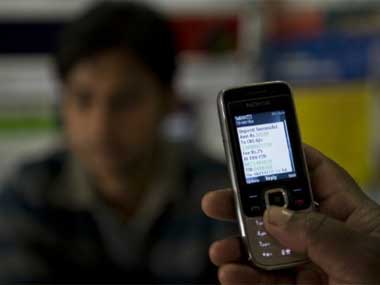Any Indian with a bank account in a bank in India can transfer upto Rs. 5,00,000 to any other account within India. On the mobile, the limit for transfer is Rs. 50,000 per day. Rupees fifty thousand is not a small amount of money, and the bank certainly needs to check that the transfer request is being made by the bona fide account holder. To make sure, banks use a series of devices, including, first, a password-enabled login, then a one-time password that is sent only to a pre-registered mobile number and, finally, a transaction password. [caption id=“attachment_220190” align=“alignleft” width=“380” caption=“Internet and mobile voting will significantly cut down the infrastructure required to conduct voting. AFP”]  [/caption] Once these three are found to be authentic, the transfer instructions are confirmed and the transaction completed. Once the transfer is made, the consumer gets a confirmation code; once the funds have been credited to the receiver, the consumer gets another text message confirming the same. Obviously, this series of safety measures has been found by the Reserve Bank of India adequate to guard against fraud. The bank, as part of the Know Your Customer norms, has the consumer’s photograph, address, e-mail id in some cases, phone and mobile numbers as may be applicable. The phone service provider, in turn, has the address details, a government issued photo proof, and so on. The bank has no doubt that the customer is who he or she claims to be. The result: the consumer, by the power to transfer funds to people or organisations he needs to transfer the funds to, saves time and is confident of the transaction. Banks save on people costs and on the paper involved in cheques, drafts and pay orders, to list the most obvious. Everyone wins. So why doesn’t the Election Commission learn from what the banking industry does and do the same with voting? Here are seven reasons why the EC MUST use tech for greater participation: Internet and mobile voting will significantly cut down the infrastructure required to conduct voting, as it will cut down the number of people who will visit the polling centres physically. Internet and mobile voting will cut down the cost of voting as far as the voter is concerned. The voter will not have to travel – however close – to the voting centre. Internet and mobile voting will allow the elderly, the ailing, and the disabled to cast their votes without the inconvenience Bad weather (as was the case in UP, with a cold wave) will not be a deterrent. There will be no need to shut office; voting will only require a couple of minutes; the productivity loss due to elections is significant, as government offices declare a holiday for the entire day and some private organisations declare a half-holiday. Youth will embrace this ability, used as they are to the Internet and mobile phones. There will be no need for multi-phase elections. It could be argued that not all voters have mobiles and even fewer have internet connectivity, but the numbers are still HUGE: As of November 2011, there were more than 800 million mobile subscribers. India was once stuck with physical ballots; we moved to the Electronic Voting Machines with alacrity. The next logical step is to embrace technology that is available, drawing from security models that are already in existence. There’s no great investment to be made – only a secure website. If the EC is genuinely concerned, how’s this for a solution: tamper-proof, fraud-proof, instant, low-cost, safe and voter-friendly. Implement this before the next Lok Sabha elections and watch the turnout shoot up.
Here are seven reasons why the EC must use tech for greater participation.
Anant Rangaswami was, until recently, the editor of Campaign India magazine, of which Anant was also the founding editor. Campaign India is now arguably India's most respected publication in the advertising and media space. Anant has over 20 years experience in media and advertising. He began in Madras, for STAR TV, moving on as Regional Manager, South for Sony’s SET and finally as Chief Manager at BCCL’s Times Television and Times FM. He then moved to advertising, rising to the post of Associate Vice President at TBWA India. Anant then made the leap into journalism, taking over as editor of what is now Campaign India's competitive publication, Impact. Anant teaches regularly and is a prolific blogger and author of Watching from the sidelines. see more


)

)
)
)
)
)
)
)
)



